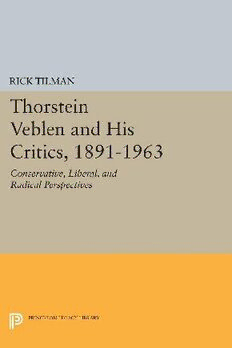
Thorstein Veblen and His Critics, 1891-1963: Conservative, Liberal, and Radical Perspectives PDF
Preview Thorstein Veblen and His Critics, 1891-1963: Conservative, Liberal, and Radical Perspectives
THORSTEIN VEBLEN AND HIS CRITICS, 1891-1963 THORSTEIN VEBLEN AND HIS CRITICS, 1891-1963 C O N S E R V A T I V E , L I B E R A L , A N D R A D I C A L P E R S P E C T I V E S RICKT ILMAN PRINCETON UNIVERSITY PRESS PRINCETON, NEW JERSEY Copyright © 1992 by Princeton University Press Published by Princeton University Press, 41 William Street, Princeton, New Jersey 08540 In the United Kingdom: Princeton University Press, Oxford AD Rights Reserved Library of Congress Cataloging-in-Publication Data Tilman, Rick. Thorstein Veblen and his critics, 1891-1963 / conservative, liberal, and radical perspectives / Rick Tilman. p. cm. Includes bibliographical references and index. ISBN 0-691-04286-1 1. Veblen, Thorstein, 1857-1929. 2. Economics—United States—History. I. Title. HB119.V4T55 1991 33o'.o92—dc20 91-21134 CIP This book has been composed in Linotron Primer Princeton University Press books are printed on acid-free paper and meet the guidelines for permanence and durability of the Committee on Production Guidelines for Book Longevity of the Council on Library Resources Printed in the United States of America 10 9 8 7 6 5 4 3 21 To my grandfather, the late Arthur Yelland (1892-1971), and my father and mother, Lee R. and Noma J. Tilman. NevacLans all. CONTENTS FOREWORD ix PREFACE XV ACKNOWLEDGMENTS xix CHAPTER ONE Veblen: The Man and His Critics 3 CHAPTER TWO Conservative Critics: The Early Period 18 CHAPTER THREE Conservative Critics: The Chicagoites 47 CHAPTER FOUR Conservative Critics: The Religious Assault 71 CHAPTER FIVE Liberal Critics: The Progressives 88 CHAPTER SIX Liberal Critics: The Institutionalists 114 CHAPTER SEVEN Liberal Critics: The Neoinstitutionalists 153 CHAPTER EIGHT Liberal Critics: Harvard and Columbia Style 163 CHAPTER NINE Radical Critics: The Frankfurt School 190 CHAPTER TEN Radical Critics: The Monthly Review 206 CHAPTER ELEVEN Radical Critics: Marxism, Trotskyism, and Social Democracy 234 CHAPTER TWELVE The Ideological Use and Abuse of Thorstein Veblen 259 NOTES 287 ARCHIVES CONSULTED 345 INDEX 351 FOREWORD T HORSTEIN VEBLEN (1857-1929) aw s arguably the most original and penetrating economist and social critic that the nU ited States has produced. Hisa nalyses dealt iwth fundamen tal social mores ; fundamental social , economic , and political proc esses ;and the fundamental belief system that underlies indiivdual be haivor ,public policy ,and social science analysis. A critic of the marek t economy ash e found it deev loping at the endo f the nineteenth and the beginning of the tew ntieth centuries and of the ideas of economico r thodoyx in the form and iwth the content then characteristic of the discipline , Veblen aw s one of the first to identify and emphasiez the emergence of the modern corporationa , nd thereby the corporate sys tem ,as a principal mode of economico rganiaz tion and control. He aw s one of the principal prehermeneutica nalysts of the preconceptions that lay behind all thought and analysis ,heid entified statuse mulation as a driivng force in economic affairs ,proivded the language iwth such terms as conspicuous consumption, pecuniary versus industrial em ,tnemyolp and sutats ,noitalumeand aw s an intellectual ally of the philosopher oJ hn eD ew y. He aw s a founder of institutional economics , the leading non-aM rixan school of economic heterodoyx in the nU ited States. As an institutionalist ,for many the institutionalist , Veblen empha siez d that the economy could be , and in fact is most meaningfully , comprehended in holistic terms and aasn eov livng process. The econ omy is a nonteleological process ofu nfolding seuq ence ehx ibiting on going cumulatiev causation. It is a comple xof institutions ,understood as habits of thought anda s neither sacrosanct nor ontologicallyg iev n. It is an arena of conflict. Aboev all ,it is something that could best udied adeuq ately only if one could someho w transcend the self-perceptions and self-rationaliaz tions that ,ensconced in culture ,come to dominate the mind-sets of indiivduals and hw ole populations. The centerpiece of the neoclassical conceptioonf ho w the economy ow rsk aw s orthodo x av lue theory. Veblens' critiuq e centered on his denial of the rationality assumption. He argued that people ew re not l"ightning calculators of pleasures or pains ,hw o o[ scillate ]liek a homo geneous globule of desire of happiness under the impulse of stimuli that shift t[ hem ] about the area , but leaev t[ hem ]intact. "He belieev d that people ew re driev n by habits and custom andb y hw ateev r consti tuted achieev ment in the currently reigning system of status emula tion. Veblen belieev d that marginal utility analysis , indeed the entire
